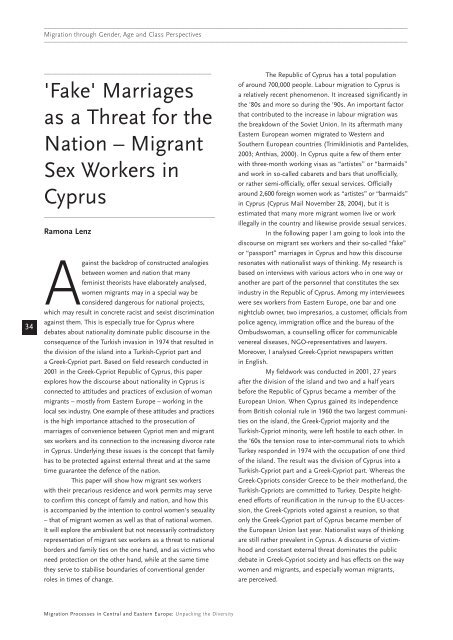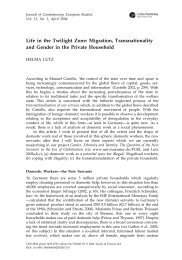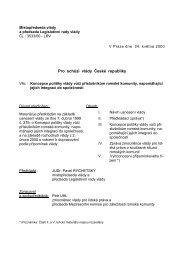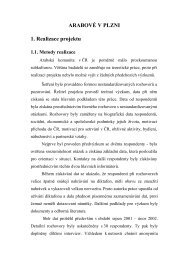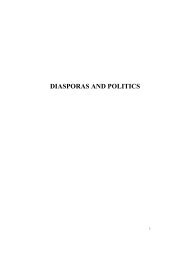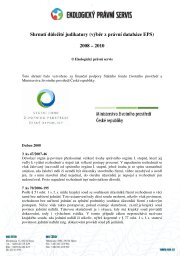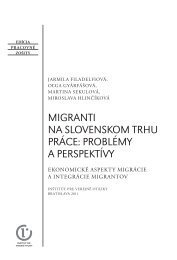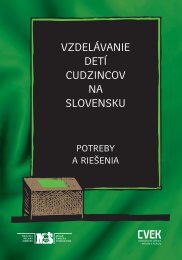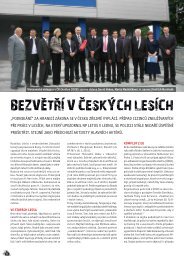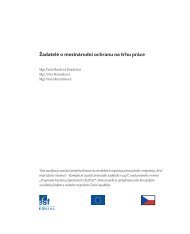Migration Processes in Central and Eastern Europe - Multiple Choices
Migration Processes in Central and Eastern Europe - Multiple Choices
Migration Processes in Central and Eastern Europe - Multiple Choices
You also want an ePaper? Increase the reach of your titles
YUMPU automatically turns print PDFs into web optimized ePapers that Google loves.
———————————————————————————————————————————————————————————————<br />
<strong>Migration</strong> through Gender, Age <strong>and</strong> Class Perspectives<br />
———————————————————————————————————————————————————————————————<br />
34<br />
—————————————————————————————<br />
'Fake' Marriages<br />
as a Threat for the<br />
Nation – Migrant<br />
Sex Workers <strong>in</strong><br />
Cyprus<br />
—————————————————————————————<br />
Ramona Lenz<br />
Aga<strong>in</strong>st the backdrop of constructed analogies<br />
between women <strong>and</strong> nation that many<br />
fem<strong>in</strong>ist theorists have elaborately analysed,<br />
women migrants may <strong>in</strong> a special way be<br />
considered dangerous for national projects,<br />
which may result <strong>in</strong> concrete racist <strong>and</strong> sexist discrim<strong>in</strong>ation<br />
aga<strong>in</strong>st them. This is especially true for Cyprus where<br />
debates about nationality dom<strong>in</strong>ate public discourse <strong>in</strong> the<br />
consequence of the Turkish <strong>in</strong>vasion <strong>in</strong> 1974 that resulted <strong>in</strong><br />
the division of the isl<strong>and</strong> <strong>in</strong>to a Turkish-Cypriot part <strong>and</strong><br />
a Greek-Cypriot part. Based on field research conducted <strong>in</strong><br />
2001 <strong>in</strong> the Greek-Cypriot Republic of Cyprus, this paper<br />
explores how the discourse about nationality <strong>in</strong> Cyprus is<br />
connected to attitudes <strong>and</strong> practices of exclusion of woman<br />
migrants – mostly from <strong>Eastern</strong> <strong>Europe</strong> – work<strong>in</strong>g <strong>in</strong> the<br />
local sex <strong>in</strong>dustry. One example of these attitudes <strong>and</strong> practices<br />
is the high importance attached to the prosecution of<br />
marriages of convenience between Cypriot men <strong>and</strong> migrant<br />
sex workers <strong>and</strong> its connection to the <strong>in</strong>creas<strong>in</strong>g divorce rate<br />
<strong>in</strong> Cyprus. Underly<strong>in</strong>g these issues is the concept that family<br />
has to be protected aga<strong>in</strong>st external threat <strong>and</strong> at the same<br />
time guarantee the defence of the nation.<br />
This paper will show how migrant sex workers<br />
with their precarious residence <strong>and</strong> work permits may serve<br />
to confirm this concept of family <strong>and</strong> nation, <strong>and</strong> how this<br />
is accompanied by the <strong>in</strong>tention to control women's sexuality<br />
– that of migrant women as well as that of national women.<br />
It will explore the ambivalent but not necessarily contradictory<br />
representation of migrant sex workers as a threat to national<br />
borders <strong>and</strong> family ties on the one h<strong>and</strong>, <strong>and</strong> as victims who<br />
need protection on the other h<strong>and</strong>, while at the same time<br />
they serve to stabilise boundaries of conventional gender<br />
roles <strong>in</strong> times of change.<br />
The Republic of Cyprus has a total population<br />
of around 700,000 people. Labour migration to Cyprus is<br />
a relatively recent phenomenon. It <strong>in</strong>creased significantly <strong>in</strong><br />
the '80s <strong>and</strong> more so dur<strong>in</strong>g the '90s. An important factor<br />
that contributed to the <strong>in</strong>crease <strong>in</strong> labour migration was<br />
the breakdown of the Soviet Union. In its aftermath many<br />
<strong>Eastern</strong> <strong>Europe</strong>an women migrated to Western <strong>and</strong><br />
Southern <strong>Europe</strong>an countries (Trimikl<strong>in</strong>iotis <strong>and</strong> Pantelides,<br />
2003; Anthias, 2000). In Cyprus quite a few of them enter<br />
with three-month work<strong>in</strong>g visas as “artistes” or “barmaids”<br />
<strong>and</strong> work <strong>in</strong> so-called cabarets <strong>and</strong> bars that unofficially,<br />
or rather semi-officially, offer sexual services. Officially<br />
around 2,600 foreign women work as “artistes” or “barmaids”<br />
<strong>in</strong> Cyprus (Cyprus Mail November 28, 2004), but it is<br />
estimated that many more migrant women live or work<br />
illegally <strong>in</strong> the country <strong>and</strong> likewise provide sexual services.<br />
In the follow<strong>in</strong>g paper I am go<strong>in</strong>g to look <strong>in</strong>to the<br />
discourse on migrant sex workers <strong>and</strong> their so-called “fake”<br />
or “passport” marriages <strong>in</strong> Cyprus <strong>and</strong> how this discourse<br />
resonates with nationalist ways of th<strong>in</strong>k<strong>in</strong>g. My research is<br />
based on <strong>in</strong>terviews with various actors who <strong>in</strong> one way or<br />
another are part of the personnel that constitutes the sex<br />
<strong>in</strong>dustry <strong>in</strong> the Republic of Cyprus. Among my <strong>in</strong>terviewees<br />
were sex workers from <strong>Eastern</strong> <strong>Europe</strong>, one bar <strong>and</strong> one<br />
nightclub owner, two impresarios, a customer, officials from<br />
police agency, immigration office <strong>and</strong> the bureau of the<br />
Ombudswoman, a counsell<strong>in</strong>g officer for communicable<br />
venereal diseases, NGO-representatives <strong>and</strong> lawyers.<br />
Moreover, I analysed Greek-Cypriot newspapers written<br />
<strong>in</strong> English.<br />
My fieldwork was conducted <strong>in</strong> 2001, 27 years<br />
after the division of the isl<strong>and</strong> <strong>and</strong> two <strong>and</strong> a half years<br />
before the Republic of Cyprus became a member of the<br />
<strong>Europe</strong>an Union. When Cyprus ga<strong>in</strong>ed its <strong>in</strong>dependence<br />
from British colonial rule <strong>in</strong> 1960 the two largest communities<br />
on the isl<strong>and</strong>, the Greek-Cypriot majority <strong>and</strong> the<br />
Turkish-Cypriot m<strong>in</strong>ority, were left hostile to each other. In<br />
the '60s the tension rose to <strong>in</strong>ter-communal riots to which<br />
Turkey responded <strong>in</strong> 1974 with the occupation of one third<br />
of the isl<strong>and</strong>. The result was the division of Cyprus <strong>in</strong>to a<br />
Turkish-Cypriot part <strong>and</strong> a Greek-Cypriot part. Whereas the<br />
Greek-Cypriots consider Greece to be their motherl<strong>and</strong>, the<br />
Turkish-Cypriots are committed to Turkey. Despite heightened<br />
efforts of reunification <strong>in</strong> the run-up to the EU-accession,<br />
the Greek-Cypriots voted aga<strong>in</strong>st a reunion, so that<br />
only the Greek-Cypriot part of Cyprus became member of<br />
the <strong>Europe</strong>an Union last year. Nationalist ways of th<strong>in</strong>k<strong>in</strong>g<br />
are still rather prevalent <strong>in</strong> Cyprus. A discourse of victimhood<br />
<strong>and</strong> constant external threat dom<strong>in</strong>ates the public<br />
debate <strong>in</strong> Greek-Cypriot society <strong>and</strong> has effects on the way<br />
women <strong>and</strong> migrants, <strong>and</strong> especially woman migrants,<br />
are perceived.<br />
<strong>Migration</strong> <strong>Processes</strong> <strong>in</strong> <strong>Central</strong> <strong>and</strong> <strong>Eastern</strong> <strong>Europe</strong>: Unpack<strong>in</strong>g the Diversity


